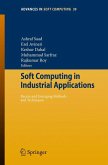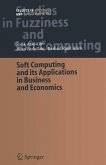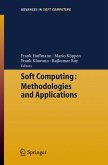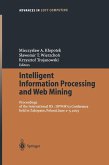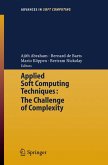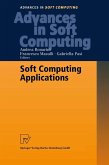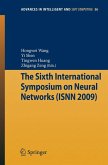Applications and Science in Soft Computing (eBook, PDF)
Redaktion: Lotfi, Ahmad; Garibaldi, Jonathan M.
161,95 €
161,95 €
inkl. MwSt.
Sofort per Download lieferbar

81 °P sammeln
161,95 €
Als Download kaufen

161,95 €
inkl. MwSt.
Sofort per Download lieferbar

81 °P sammeln
Jetzt verschenken
Alle Infos zum eBook verschenken
161,95 €
inkl. MwSt.
Sofort per Download lieferbar
Alle Infos zum eBook verschenken

81 °P sammeln
Applications and Science in Soft Computing (eBook, PDF)
Redaktion: Lotfi, Ahmad; Garibaldi, Jonathan M.
- Format: PDF
- Merkliste
- Auf die Merkliste
- Bewerten Bewerten
- Teilen
- Produkt teilen
- Produkterinnerung
- Produkterinnerung

Bitte loggen Sie sich zunächst in Ihr Kundenkonto ein oder registrieren Sie sich bei
bücher.de, um das eBook-Abo tolino select nutzen zu können.
Hier können Sie sich einloggen
Hier können Sie sich einloggen
Sie sind bereits eingeloggt. Klicken Sie auf 2. tolino select Abo, um fortzufahren.

Bitte loggen Sie sich zunächst in Ihr Kundenkonto ein oder registrieren Sie sich bei bücher.de, um das eBook-Abo tolino select nutzen zu können.
The book covers the theory and application of soft computing techniques namely; neural networks, fuzzy logic, evolutionary computing and complex systems. The book is a collection of selected, edited papers presented at the 4 th conference RACS Recent Advances in Soft Computing held in Nottingham, December 2002. It provides the latest developments in applications of soft computing techniques as well as advances in theoretical aspects of soft computing.
- Geräte: PC
- ohne Kopierschutz
- eBook Hilfe
- Größe: 3.71MB
Andere Kunden interessierten sich auch für
![Soft Computing in Industrial Applications (eBook, PDF) Soft Computing in Industrial Applications (eBook, PDF)]() Soft Computing in Industrial Applications (eBook, PDF)161,95 €
Soft Computing in Industrial Applications (eBook, PDF)161,95 €![Soft Computing and its Applications in Business and Economics (eBook, PDF) Soft Computing and its Applications in Business and Economics (eBook, PDF)]() Rafik Aziz AlievSoft Computing and its Applications in Business and Economics (eBook, PDF)113,95 €
Rafik Aziz AlievSoft Computing and its Applications in Business and Economics (eBook, PDF)113,95 €![Soft Computing: Methodologies and Applications (eBook, PDF) Soft Computing: Methodologies and Applications (eBook, PDF)]() Soft Computing: Methodologies and Applications (eBook, PDF)161,95 €
Soft Computing: Methodologies and Applications (eBook, PDF)161,95 €![Intelligent Information Processing and Web Mining (eBook, PDF) Intelligent Information Processing and Web Mining (eBook, PDF)]() Intelligent Information Processing and Web Mining (eBook, PDF)113,95 €
Intelligent Information Processing and Web Mining (eBook, PDF)113,95 €![Applied Soft Computing Technologies: The Challenge of Complexity (eBook, PDF) Applied Soft Computing Technologies: The Challenge of Complexity (eBook, PDF)]() Applied Soft Computing Technologies: The Challenge of Complexity (eBook, PDF)233,95 €
Applied Soft Computing Technologies: The Challenge of Complexity (eBook, PDF)233,95 €![Soft Computing Applications (eBook, PDF) Soft Computing Applications (eBook, PDF)]() Soft Computing Applications (eBook, PDF)40,95 €
Soft Computing Applications (eBook, PDF)40,95 €![The Sixth International Symposium on Neural Networks (ISNN 2009) (eBook, PDF) The Sixth International Symposium on Neural Networks (ISNN 2009) (eBook, PDF)]() The Sixth International Symposium on Neural Networks (ISNN 2009) (eBook, PDF)233,95 €
The Sixth International Symposium on Neural Networks (ISNN 2009) (eBook, PDF)233,95 €-
-
-
The book covers the theory and application of soft computing techniques namely; neural networks, fuzzy logic, evolutionary computing and complex systems. The book is a collection of selected, edited papers presented at the 4th conference RACS Recent Advances in Soft Computing held in Nottingham, December 2002. It provides the latest developments in applications of soft computing techniques as well as advances in theoretical aspects of soft computing.
Hinweis: Dieser Artikel kann nur an eine deutsche Lieferadresse ausgeliefert werden.
Dieser Download kann aus rechtlichen Gründen nur mit Rechnungsadresse in A, B, BG, CY, CZ, D, DK, EW, E, FIN, F, GR, HR, H, IRL, I, LT, L, LR, M, NL, PL, P, R, S, SLO, SK ausgeliefert werden.
Hinweis: Dieser Artikel kann nur an eine deutsche Lieferadresse ausgeliefert werden.
Produktdetails
- Produktdetails
- Verlag: Springer Berlin Heidelberg
- Seitenzahl: 346
- Erscheinungstermin: 29. Juni 2013
- Englisch
- ISBN-13: 9783540452409
- Artikelnr.: 53380199
- Verlag: Springer Berlin Heidelberg
- Seitenzahl: 346
- Erscheinungstermin: 29. Juni 2013
- Englisch
- ISBN-13: 9783540452409
- Artikelnr.: 53380199
- Herstellerkennzeichnung Die Herstellerinformationen sind derzeit nicht verfügbar.
Ahmad Lotfi, The Nottingham Trent University, UK / Jonathon M. Garibaldi, University of Nottingham, UK
I - Artificial Neural Networks.- A Recurrent Self-Organizing Map for Temporal Sequence Processing.- Optimisation of Neural Network Topology and Input Parameters for Prosody Modelling of Synthetic Speech.- Using ART1 Neural Networks to Determine Clustering Tendency.- High Performance Associative Memories and Structured Weight Dilution.- Neural Network Analysis of Estimation of Data.- A Compiler and Simulator for Partial Recursive Functions over Neural Networks.- Multistage Neural Networks: Adaptive Combination of Ensemble Results.- On the Fuzzy Spatio-temporal Specification of Multimedia Synchronisation Scenarios.- II - Evolutionary Computing.- An Approach to On-line Design of Fuzzy Controllers with Evolving Structure.- Can a Parallel Agent Approach to Genetic Algorithms Reduce Search Times.- Comparison of Domination Approaches for Diploid Binary Genetic Algorithms.- New Heuristics for Flowshop Scheduling.- Temporal Rule Discovery using Genetic Programming and Specialized Hardware.- Genetic Programming with Guaranteed Constraints.- III - Fuzzy Systems.- Precisiated Natural Language and Protoforms for Human Consistent Data Mining.- Design and Synthesis of Piecewise-Linear Fuzzy Systems.- A New Ranking Method For Fuzzy FMEA.- Representing Reliability and Hesitation in Possibility Theory: A General Framework.- Noise Clustering with a Fixed Fraction of Noise.- Selective Sampling for Combined Learning from Labelled and Unlabelled Data.- IV - Hybrid and Intelligent Systems.- New Results for a Hybrid Decision Tree/Genetic Algorithm for Data Mining.- Embedding Support Vector Machines into Localised Mixtures of Experts.- Gaussian Function Approximation in Neuro-Fuzzy Systems.- Automated Configuration of Multi-Spindle Drilling Gear Machines by Sub-Domain KnowledgeProcessing and Adaptive Algorithms.- Construction of Shape-preserving First-order Takagi-Sugeno Systems via Linear-rational Spline Fuzzy Partitions.- Identification of Dynamic Cause-Effect Relations for Systems Performance Evaluation.- A Multi-layered Immune Inspired Machine Learning Algorithm.- Using Plausible Reasoning for Developing Intelligent Systems.- Towards Model-Independent Mode Detection and Characterisation of Very Long Biomedical Time Series.- Analysis of Rules Discovered by the Data Mining Process.- A Study of Query Generation Strategies for Interactive Constraint Acquisition.- A Multi-agent System as Framework for Learning Algorithms Benchmarking.- Soft Learning: A Conceptual Bridge between Data Mining and Machine Learning.- Heuristics for Kernels Adaptation in Support Vector Machines.- A Study of the Effectiveness of Detailed Balance in Avoiding Premature Convergence in PBIL.- V - Soft Computing Applications.- Application of Computational Intelligence Methods for Intelligent Modelling of Buildings.- An Adaptive Multi Embedded-Agent Architecture for Intelligent Inhabited Environments.- Constraint Neuro-Model based Predictive Control.- An Efficient Hybrid Method of Regression Tree and Fuzzy Inference for Short-term Load Forecasting in Electric Power Systems.- An Iterative Learning Control Method for a Level Control Problem.- Face Verification Using SVM: Influence of Illumination.- A Neuro-Fuzzy Technique for Scene Cut Detection from MPEG-1 Video.- Fuzzy Audio-Visual Feature Maps for Speaker Identification.- Adaptive User Agents for Intelligent Biometric Applications.- Gait Recognition by Moment Based Descriptors.- On a Large Sequence-Based Human Gait Database.
I - Artificial Neural Networks.- A Recurrent Self-Organizing Map for Temporal Sequence Processing.- Optimisation of Neural Network Topology and Input Parameters for Prosody Modelling of Synthetic Speech.- Using ART1 Neural Networks to Determine Clustering Tendency.- High Performance Associative Memories and Structured Weight Dilution.- Neural Network Analysis of Estimation of Data.- A Compiler and Simulator for Partial Recursive Functions over Neural Networks.- Multistage Neural Networks: Adaptive Combination of Ensemble Results.- On the Fuzzy Spatio-temporal Specification of Multimedia Synchronisation Scenarios.- II - Evolutionary Computing.- An Approach to On-line Design of Fuzzy Controllers with Evolving Structure.- Can a Parallel Agent Approach to Genetic Algorithms Reduce Search Times.- Comparison of Domination Approaches for Diploid Binary Genetic Algorithms.- New Heuristics for Flowshop Scheduling.- Temporal Rule Discovery using Genetic Programming and Specialized Hardware.- Genetic Programming with Guaranteed Constraints.- III - Fuzzy Systems.- Precisiated Natural Language and Protoforms for Human Consistent Data Mining.- Design and Synthesis of Piecewise-Linear Fuzzy Systems.- A New Ranking Method For Fuzzy FMEA.- Representing Reliability and Hesitation in Possibility Theory: A General Framework.- Noise Clustering with a Fixed Fraction of Noise.- Selective Sampling for Combined Learning from Labelled and Unlabelled Data.- IV - Hybrid and Intelligent Systems.- New Results for a Hybrid Decision Tree/Genetic Algorithm for Data Mining.- Embedding Support Vector Machines into Localised Mixtures of Experts.- Gaussian Function Approximation in Neuro-Fuzzy Systems.- Automated Configuration of Multi-Spindle Drilling Gear Machines by Sub-Domain KnowledgeProcessing and Adaptive Algorithms.- Construction of Shape-preserving First-order Takagi-Sugeno Systems via Linear-rational Spline Fuzzy Partitions.- Identification of Dynamic Cause-Effect Relations for Systems Performance Evaluation.- A Multi-layered Immune Inspired Machine Learning Algorithm.- Using Plausible Reasoning for Developing Intelligent Systems.- Towards Model-Independent Mode Detection and Characterisation of Very Long Biomedical Time Series.- Analysis of Rules Discovered by the Data Mining Process.- A Study of Query Generation Strategies for Interactive Constraint Acquisition.- A Multi-agent System as Framework for Learning Algorithms Benchmarking.- Soft Learning: A Conceptual Bridge between Data Mining and Machine Learning.- Heuristics for Kernels Adaptation in Support Vector Machines.- A Study of the Effectiveness of Detailed Balance in Avoiding Premature Convergence in PBIL.- V - Soft Computing Applications.- Application of Computational Intelligence Methods for Intelligent Modelling of Buildings.- An Adaptive Multi Embedded-Agent Architecture for Intelligent Inhabited Environments.- Constraint Neuro-Model based Predictive Control.- An Efficient Hybrid Method of Regression Tree and Fuzzy Inference for Short-term Load Forecasting in Electric Power Systems.- An Iterative Learning Control Method for a Level Control Problem.- Face Verification Using SVM: Influence of Illumination.- A Neuro-Fuzzy Technique for Scene Cut Detection from MPEG-1 Video.- Fuzzy Audio-Visual Feature Maps for Speaker Identification.- Adaptive User Agents for Intelligent Biometric Applications.- Gait Recognition by Moment Based Descriptors.- On a Large Sequence-Based Human Gait Database.

